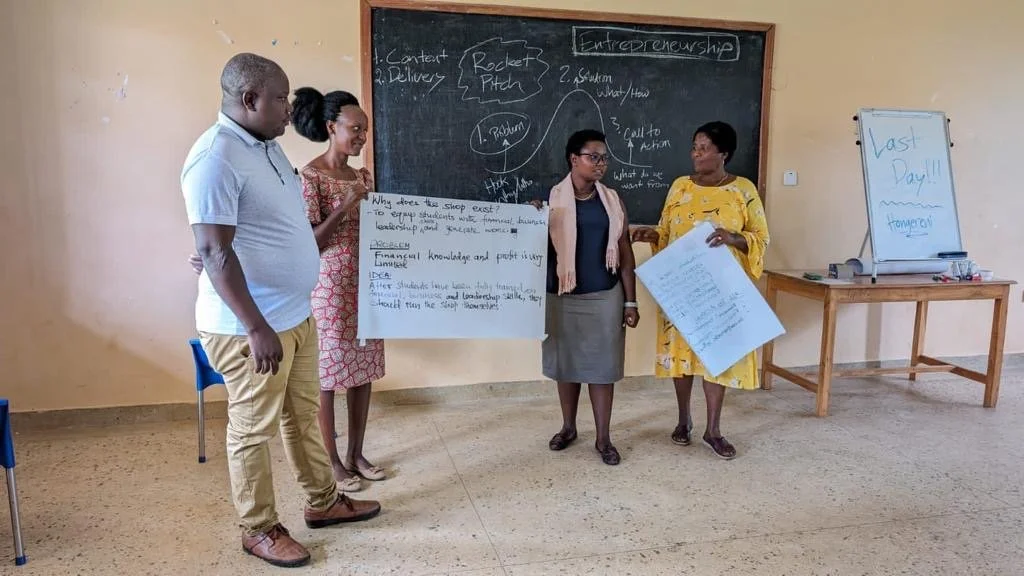SEGA and Babson College: Fostering Entrepreneurial Leadership in Tanzanian Girls
In January 2024, SEGA welcomed a group of entrepreneurship students from Babson College who helped facilitate a workshop on Entrepreneurial Thought & Action™. The SEGA entrepreneurship education team and teachers, life skills instructors, and administrators worked in groups to create an actionable list of potential innovations within the SEGA entrepreneurship program.
Entrepreneurship has always been close to SEGA’s heart, and it is to equip Tanzanian girls with practical skills for self-sufficiency and leadership to eliminate poverty and create sustainable growth for themselves, their families, and their communities. SEGA has built a robust entrepreneurship training program over the years, with every Form 3 student participating in more than three different business projects, learning skills such as inventory management, sales, bookkeeping, poultry farming, sewing, and peer-to-peer leadership. SEGA students have also ranked regionally and nationally in business plan competitions, often with podium or first-place finishes. The need for greater impact, however, is also evident. Approximately 95% of Tanzanian businesses are considered small and medium enterprises (SMEs), many survivalist enterprises. This occurs when a person’s position of severe lack drives them to entrepreneurial activity out of necessity, often on a very small scale and remaining within the informal economy (citation). Over 54% of these SMEs are women-led (citation). SEGA aims to equip girls with skills that will take them beyond the status quo, becoming job creators, innovators, and global business leaders who will build the future for Tanzania and the continent of Africa.
Connecting with Babson
SEGA’s relationship with Babson College began in early 2022, inviting Babson student mentors to teach an online entrepreneurship intensive to a group of Form 3 students. Babson College is a Wellesley, Massachusetts-based business college known worldwide for its leadership in entrepreneurship education. Babson was the original pioneer of entrepreneurship as a field of study and has consistently ranked as the top entrepreneurship university in the United States for over 30 years. Its core concept is Entrepreneurial Thought & Action (ET&A)™, which views entrepreneurship as a method of thinking and acting that allows individuals to experiment, learn, and create in an iterative process. Babson also believes that rather than being an innate ability, entrepreneurship is a practice that can be learned and, when integrated with core values of social value creation, is an unparalleled force for good.
One of Babson’s initiatives is known as the Babson Youth Entrepreneurship Program (BYEP), which equips Babson undergraduate students with mentoring skills to teach entrepreneurship to primary and secondary school students in Massachusetts and abroad. The BYEP program runs several short entrepreneurship intensives annually in collaboration with partner schools across Tanzania, South Sudan, and Brazil. SEGA partnered with Babson in early 2023 to bring BYEP online to their Form 3 students. After that first program, Levi—then a rising fourth-year undergraduate student at Babson—joined the SEGA team as a consulting intern, helping to document SEGA’s existing entrepreneurship program and offer suggestions for how Babson may be able to add value. After the internship, the entrepreneurship education team at SEGA invited Babson to send a student team during the January break to lead a workshop on Babson’s Entrepreneurial Thought & Action methodology, focusing on business ideation and community value creation.
The Babson Team:
Bidhi Mandal - Class of 2024
Bidhi is a first-generation international student from Nepal. She is a Global Scholar and a Natalie Taylor Scholar at Babson College. She is really passionate about looking at entrepreneurship as a tool for social change. She has taught entrepreneurship in Tanzania, Kenya, China, Nepal, and the US. Apart from teaching entrepreneurship, Bidhi started the Babson Social Impact Club to help business students find opportunities to create real impact in the world. The main motivation for coming on the SEGA trip was to learn hands-on about entrepreneurship's impact on different communities.
Peter D’Ambrosio - Class of 2024
Peter’s passion for entrepreneurship stems from his drive to solve social problems in the world. The BYEP / SEGA program was one of his most impactful and rewarding experiences, revitalizing his goal of helping others. At Babson, Peter lives in an entrepreneurship community and launched Scholars of Finance to inspire character and integrity in future finance leaders. He believes improving how capital is allocated is the strongest lever to condense the time it takes to solve social problems. Peter hopes to build an ethically focused Venture Capital / Private Equity Firm that can serve as a trailblazer and help guide other firms toward ethical capital allocation.
Levi Lowney - Class of 2024
Levi’s interest in entrepreneurship began as a young boy growing up between Tanzania, Kenya, and the United States. Seeing a need for foundational entrepreneurship skills in himself and in his community, Levi decided to attend Babson to do first and then teach. The BYEP program provided a way for Levi to practice this while still in university, and he now manages the program alongside Babson faculty and other student mentors. Combining this with his other interests in government and his faith, Levi’s goal is to use entrepreneurship as a catalyst for individual, community, and national impact.
January ET&A Workshop
SEGA’s strengths in entrepreneurship education lie in its emphasis on learning business management skills through practical application. It gives its students experience running small businesses on campus and in local markets. SEGA and the Babson team decided that Babson’s greatest value-add would be equipping SEGA entrepreneurship educators to encourage student innovation through the ET&A methodology with a community-oriented mindset. Entrepreneurial Thought & Action are characterized by iterative experimentation, employing the means at hand and enrolling stakeholders to take affordable risks to learn. This “bias for action” differs from traditional thinking in entrepreneurship education, which emphasizes a collection of activities that involve detailed planning steps to achieve set goals. Babson believes that in the modern, fast-changing environment, detailed planning is less effective than building competency for rapid testing, validating assumptions quickly, and pivoting strategies to accomplish a desired impact based on a set of core values. This practice is paired with a commitment to value creation, harnessing the entrepreneurial engine to create solutions to society’s greatest challenges. By equipping SEGA’s entrepreneurship educators to use and teach this methodology, SEGA aims to launch its students as social innovators and business leaders in Tanzania and worldwide.
A group of SEGA administrators, teachers, and staff from multiple disciplines participated in the workshop, including mathematics, commerce, bookkeeping, leadership, life skills, and entrepreneurship. Over the course of three days, the faculty practiced applying the ET&A methodology for themselves through an ideation sprint aimed at innovating on SEGA’s current entrepreneurship program. Looking first at value alignment, the group did a deep dive into understanding the program as it existed and then connected it with SEGA’s core values and theory of change to identify gaps in the achieved versus desired impact. They were then divided into three cross-disciplinary groups, each tasked with creating a list of potential innovations for the sewing, poultry, or shop programs and evaluating each idea based on its feasibility and impact. Once the list was narrowed to one idea per group, the teams refined their ideas and pitched them to the SEGA Director and a visiting board member.
Outcomes
First and foremost, this workshop brought a variety of faculty and staff from academic divisions that would normally be siloed from the entrepreneurship program. It allowed them to see how their respective disciplines contribute to a holistic entrepreneurship education program. By building cross-disciplinary teams and working together on practical problems within their organization, they also began laying the foundation of an organizational, entrepreneurial culture that applies continuous innovation at every level, internally and externally. Not only this, but the practical application of the ET&A methodology on SEGA’s programs gave the faculty teams valuable first-hand experience from which to draw as they pass on the knowledge and mindset to their students.
In addition to the learning and training, using ET&A to develop innovations in the entrepreneurship program left SEGA with an actionable list of changes that could feasibly be implemented immediately. The three teams developed one best recommendation for the shop, sewing, and poultry programs, but they also had lists of several other potential ideas to explore further. They could present all of these to the director and board with a unified vision and momentum to take the entrepreneurship program at SEGA to the next level.
From the Babson team, it was an honor to come and work with the SEGA team; we learned so much from you. We are so excited to see how the entrepreneurship program continues to grow and to continue building the relationship between SEGA and Babson. We honor your work in Tanzania and couldn’t be prouder to have played a small role in your impact on the lives of these girls—many blessings.


